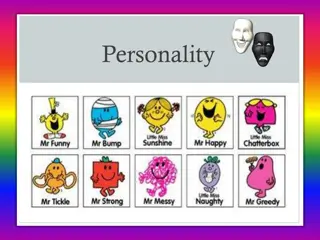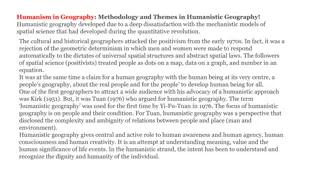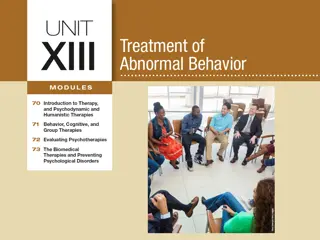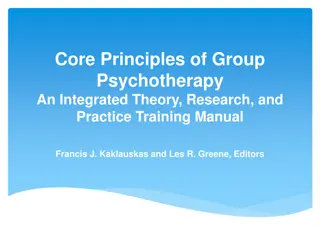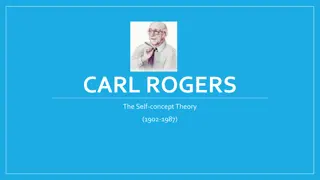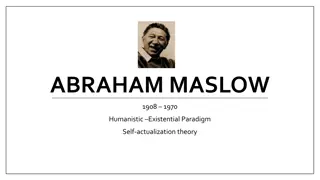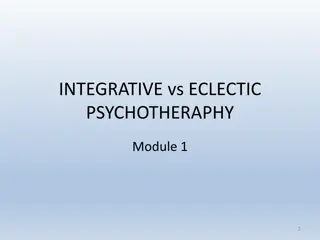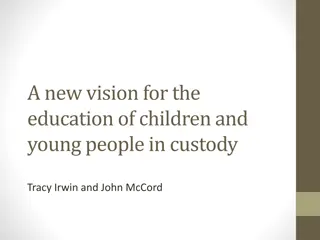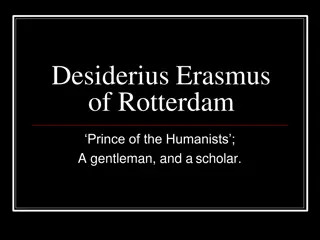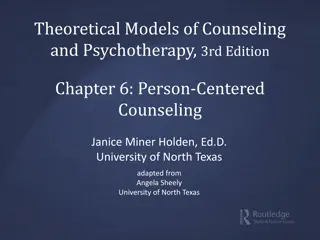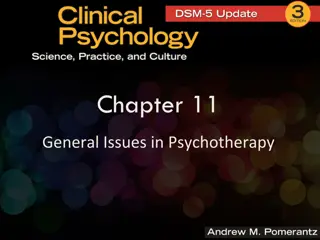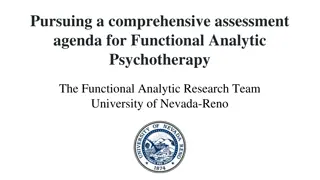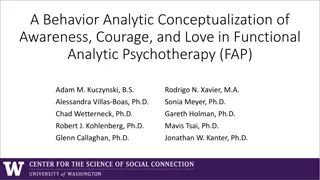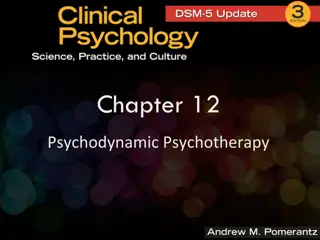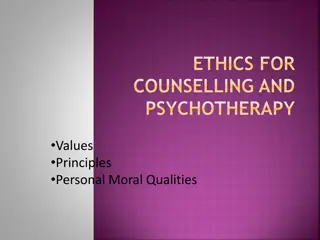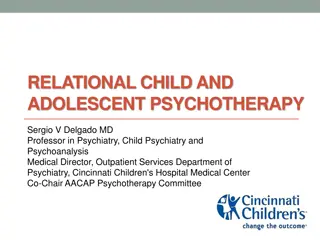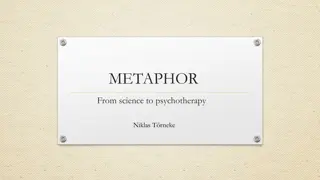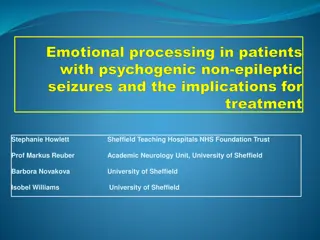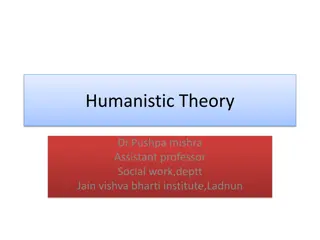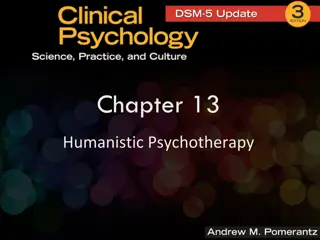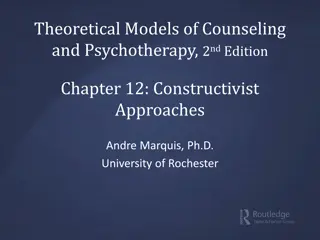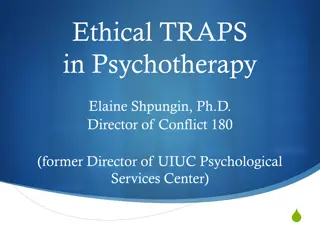Outcomes Research
Explore the definition and importance of outcomes research in managed care, including the tools used to measure clinical, economic, and humanistic outcomes. Discover the role of managed care pharmacists in outcomes research.
3 views • 20 slides
Virtual Meeting Psychotherapy | Virtualpsychiatriccare.com
Find support and healing through virtual meeting psychotherapy at Virtualpsychiatriccare.com. Our compassionate team offers convenient and effective virtual care for your mental health needs. Start your journey to wellness today.
2 views • 1 slides
Understanding Personality: Theories, Types, and Assessment
Exploring the intricate world of personality, this comprehensive guide delves into major theories of personality development, assessment methods, cultural influences, and key contributors. Discover the different types of personalities, including Type A and Type B, and unravel the complexities of psy
1 views • 96 slides
If you are looking for Therapy For Stress in Millfarm
If you are looking for Therapy For Stress in Millfarm, Fundamentals Psychotherapy is a reputable counselling service that offers professional and compassionate support to individuals seeking mental health assistance. With a team of experienced therapists, Fundamentals Psychotherapy provides a safe a
0 views • 6 slides
Understanding Personality: Theories and Components Explained
Personality is the unique and enduring characteristics that define individuals, influencing their behavior consistently over time. Explore the origins of personality from the Latin word 'persona' meaning 'mask', and delve into major perspectives such as psychoanalytic, trait, humanistic, and social-
1 views • 45 slides
Understanding Maslow's Hierarchy of Needs in Humanistic Psychology
Humanistic psychologists, such as Abraham Maslow and Carl Rogers, viewed personality as a quest for self-determination and self-realization. Maslow's hierarchy of needs illustrates how individuals progress from fulfilling basic physiological needs to achieving self-actualization and self-transcenden
0 views • 25 slides
Understanding Erotic Transference in Psychotherapy
Erotic transference in psychotherapy involves unconscious feelings and desires that are transferred to the therapist, often presenting as sexual in nature. This phenomenon reflects unmet needs such as attachment, warmth, and validation, and may involve a re-enactment of prior relationships. Early si
0 views • 13 slides
Understanding Ayurveda and Psychotherapy for Mental Health
Ayurveda, the Science of Life, offers a holistic approach to health encompassing physical, mental, and spiritual well-being. It emphasizes three treatment modalities, including psychotherapy. Psychotherapy, a key element in modern mental health, involves the treatment of emotional issues to promote
1 views • 15 slides
Humanism in Geography: Methodology and Themes
Humanistic geography emerged as a critique of mechanistic spatial models during the quantitative revolution, emphasizing human agency, consciousness, and creativity in understanding the complexities of human-place relationships. It rejects geometric determinism and celebrates individual dignity, pro
0 views • 4 slides
Understanding Suggestopedia: A Humanistic Approach to Language Learning
Suggestopedia, an affective-humanistic approach to language learning, aims to eliminate negative feelings towards studying and boost students' confidence. By incorporating elements like posters, encouraging interactions, music, and student participation, this method emphasizes the teacher's authorit
0 views • 9 slides
Evaluating the Effectiveness of Psychotherapy: Evidence and Critiques
Evidence suggests that psychotherapy works for many individuals, with high satisfaction rates reported. Critics, however, raise concerns about placebo effects, therapist biases, and human biases influencing perceptions of success. Clinicians acknowledge successful cases but remain cautious of cognit
0 views • 36 slides
Evolution of Group Psychotherapy: A Historical Overview
Explore the rich history and key developments in group psychotherapy, from the early influences of Gustave LeBon and Sigmund Freud to pioneers like Joseph Pratt, Jacob Moreno, and Samuel Slavson. Delve into the mid-century contributions of A.S.H. Foulkes and Wilfred Bion, and the origins of cognitiv
2 views • 160 slides
Carl Rogers and the Self-Concept Theory
Carl Rogers, a prominent figure in personality theory, emphasized individuals' constructive potential and the impact of their subjective experiences on personality development. He viewed individuals as goal-directed and capable of change, with the environment playing a facilitating or inhibiting rol
1 views • 78 slides
Understanding Abraham Maslow's Humanistic Existential Paradigm
Explore the key concepts of Abraham Maslow's humanistic existential paradigm, including self-actualization theory, perspective, and views on need gratification. Learn about Maslow's belief in human potential, the motive for self-actualization, and the importance of need gratification in realizing in
1 views • 81 slides
Understanding Enduring Relational Themes in Psychotherapy
Exploring the concept of Enduring Relational Themes (ERTs) in psychotherapy, this content delves into the history of transference in Gestalt therapy, contemporary psychoanalysis perspectives, forms of transference, and Lynne Jacobs' insights. It highlights how ERTs manifest, their impact on therapy,
5 views • 9 slides
Understanding Conflict Management: Key Perspectives and Approaches
Explore the multifaceted realm of conflict management through the lenses of traditional, humanistic, and interactionistic views. Delve into the definition, nature, and implications of conflict, and assess varying opinions on confrontation, communication, and resolution strategies within organization
1 views • 31 slides
Understanding Integrative and Eclectic Psychotherapy Approaches
Integrative Psychotherapy emphasizes treating individuals holistically across affective, behavioral, cognitive, and spiritual dimensions. It incorporates various theoretical perspectives like psychodynamic, client-centered, behaviorist, and cognitive therapies. Common factors in psychotherapy play a
3 views • 16 slides
Unveiling Positive Psychology: Shifting Focus from Weakness to Strength
Delve into the evolution and principles of positive psychology, which emerged as a reaction to traditional approaches focusing on weaknesses. Learn about its roots in humanistic psychology, and the shift towards a more holistic and strengths-based perspective. Explore how positive psychology advocat
7 views • 19 slides
Best Psychotherapy in Stonyfell
If you\u2019re looking for a Psychotherapy Treatment in Stonyfell, contact PsycFlex. They are committed to empowering individuals to overcome life's challenges, embrace personal growth, and achieve lasting positive change. They adopt a client-centere
0 views • 6 slides
Transforming Education for Young People in Custody: A New Vision
Rethinking the traditional prison education system for young people in custody, Tracy Irwin and John McCord propose a humanistic approach with self-directed and experiential learning to address literacy challenges, mental health issues, and negative learning identities. The new vision includes offen
0 views • 11 slides
Life and Legacy of Desiderius Erasmus of Rotterdam
Desiderius Erasmus, a Dutch philosopher and scholar, was a pivotal figure in the humanist movement of the Renaissance. Born in Rotterdam in 1460, Erasmus advocated for unrestricted learning, church reform, and intellectual independence. His works, such as "In Praise of Folly," left a lasting impact
0 views • 7 slides
Person-Centered Counseling: A Historical and Philosophical Overview
Person-Centered Counseling, pioneered by Carl Rogers, is grounded in humanistic principles such as actualizing tendency, awareness, and existential concepts. This approach emphasizes the innate potential for growth and self-actualization within individuals, focusing on creating a supportive and nonj
0 views • 20 slides
Understanding General Issues in Psychotherapy
The first chapter in the section on psychotherapy delves into general issues surrounding this common professional activity of clinical psychologists. It explores the question of whether psychotherapy works, how researchers should approach studying it, and the distinction between efficacy and effecti
0 views • 18 slides
Unveiling the Renaissance: A Journey of Rebirth and Humanism
Explore the transformative era of the Renaissance, a period of rebirth, flourishing art, literature, and humanistic revival after the dark Middle Ages. Discover how individuals embraced humanism, literacy thrived with the printing press invention, and the beauty of classical works was rekindled, sha
0 views • 11 slides
Understanding Psychoanalytic Psychotherapy
Psychoanalytic psychotherapy aims to increase adaptive functioning by reducing symptoms, resolving conflicts, and fostering self-reflection. The therapy involves making the unconscious conscious, strengthening the ego, and exploring childhood experiences to increase self-awareness. Therapists mainta
0 views • 63 slides
Comprehensive Assessment Agenda for Functional Analytic Psychotherapy
Pursuing a comprehensive assessment agenda in Functional Analytic Psychotherapy involves psychometric measurement of interactions in and out of session. The research team at the University of Nevada-Reno discusses the goals, challenges, and tools essential for behavior therapists and researchers, ai
0 views • 25 slides
Discovering the Right Psychotherapy for Your Well-Being
Psychotherapy offers a way to manage troubling thoughts, feelings, and behaviors to enhance well-being. Explore client and therapist characteristics, available therapeutic approaches like CBT and ERP, and considerations when choosing the right therapy for you.
0 views • 9 slides
Understanding Functional Analytic Psychotherapy (FAP) Concepts
Delve into the Behavior Analytic Conceptualization of Awareness, Courage, and Love in Functional Analytic Psychotherapy (FAP). Explore the principles of FAP, including clinically relevant behaviors, the therapeutic relationship, and the five rules guiding the practice. Discover how FAP targets behav
0 views • 21 slides
Understanding Psychodynamic Psychotherapy: Unconscious Exploration
Psychodynamic psychotherapy focuses on making the unconscious conscious through techniques like free association, dream analysis, and defense mechanisms. Clients gain insight into hidden thoughts and emotions, uncovering unconscious wishes and addressing resistance in therapy sessions.
0 views • 17 slides
Ethics and Values in Counselling and Psychotherapy
The field of counselling and psychotherapy is guided by key values, ethical principles, and professional standards aimed at respecting human rights, enhancing relationships, and promoting personal well-being. Recent developments, such as the potential introduction of statutory regulation, highlight
0 views • 19 slides
Insights into Polish Culture and Behavioral Therapy: A Comprehensive Overview
Delve into the nuances of Polish culture and the status quo of behavioral therapy and psychotherapy in Poland. Learn about the history, societal influences, and perspectives shaping the Polish identity. Explore the impact of past traumas on the collective psyche and understand the implications for t
0 views • 24 slides
Understanding Relational Child and Adolescent Psychotherapy
Explore the concepts of relational child and adolescent psychotherapy involving attachment patterns, intersubjectivity, corrective emotional experiences, and the role of the relational psychodynamic psychotherapist in providing corrective emotional experiences essential for the child's development.
0 views • 25 slides
Unveiling the Power of Metaphors in Psychotherapy
Explore the significance of metaphors in psychotherapy, tracing their roots from Aristotle's definition to modern linguistic insights. Delve into conceptual metaphors and their impact on language, cognition, and therapy practices.
0 views • 29 slides
Understanding Psychogenic Non-epileptic Seizures: A Comprehensive Overview
Sheffield Teaching Hospitals NHS Foundation Trust offers a specialist neurology psychotherapy service for patients with functional neurological symptoms. The service, established in 2003, provides brief psychotherapy sessions to patients referred by consultant neurologists. The approach includes stu
0 views • 18 slides
Understanding Humanistic Theory of Personality and its Key Concepts
Humanistic theory emphasizes the active role individuals play in their behavior, with proponents like Abraham Maslow and Carl Rogers. It focuses on humanistic psychology, existentialism, and humanism, emphasizing personal meaning and values. The theory argues for the innate goodness of individuals a
0 views • 8 slides
Understanding Humanistic Psychotherapy: Core Concepts and Goals
Humanistic psychotherapy, led by figures like Carl Rogers and Abraham Maslow, emphasizes self-actualization and positive regard in therapy. The goal is to foster natural growth and wellness by promoting congruence between real and ideal selves. Essential therapeutic conditions include empathy, uncon
0 views • 15 slides
Constructivist Approaches in Counseling and Psychotherapy: A Philosophical Perspective
Constructivist approaches in counseling and psychotherapy emphasize the ongoing process of structuring experiences to create meaning. This perspective involves philosophical underpinnings from thinkers such as the Buddha, Immanuel Kant, and Jean Piaget, highlighting the role of individual constructi
0 views • 35 slides
Understanding Ethical Traps in Psychotherapy
Delve into the complexities of ethical considerations in psychotherapy, exploring moral, ethical, and legal codes, APA General Principles, specific ethical principles such as informed consent and confidentiality, and real-world scenarios prompting ethical dilemmas in therapy practice. Consider the i
0 views • 18 slides
Standing Strong in a Humanistic World
In Philippians chapter three, Paul warns against placing confidence in worldly achievements and emphasizes the importance of knowing Christ. He exhorts believers to focus on their citizenship in heaven and eagerly await the transformation by Jesus Christ. The prevailing humanistic narrative of socie
0 views • 46 slides
Best Couples Counselling in Thornhill Woods
If you want the Best Couples Counselling in Thornhill Woods, visit Psychotherapy Essence. At Psychotherapy Essence, they help individuals overcome their challenges and achieve their full potential. They specialize in depression, couples counseling, a
1 views • 6 slides


